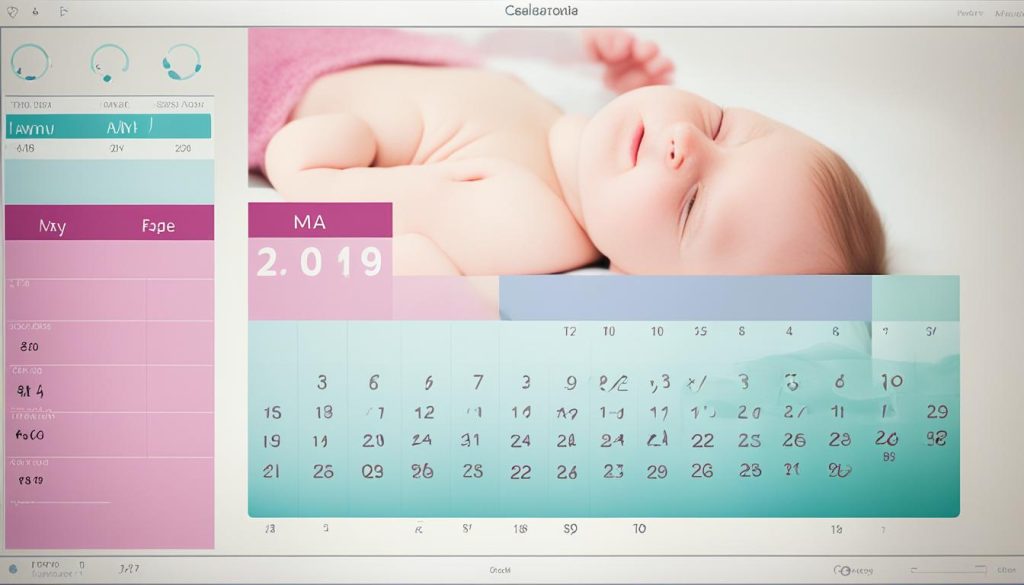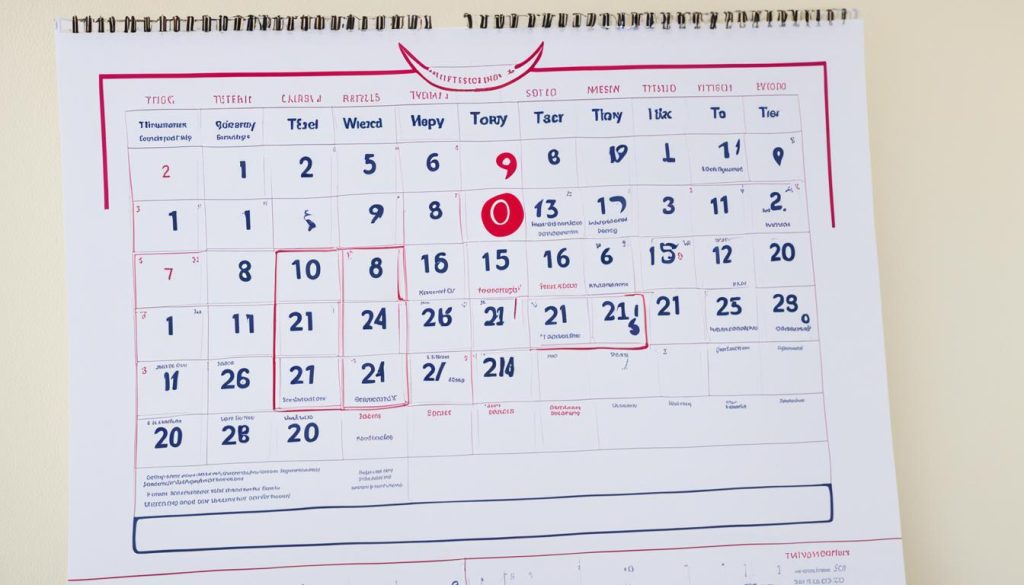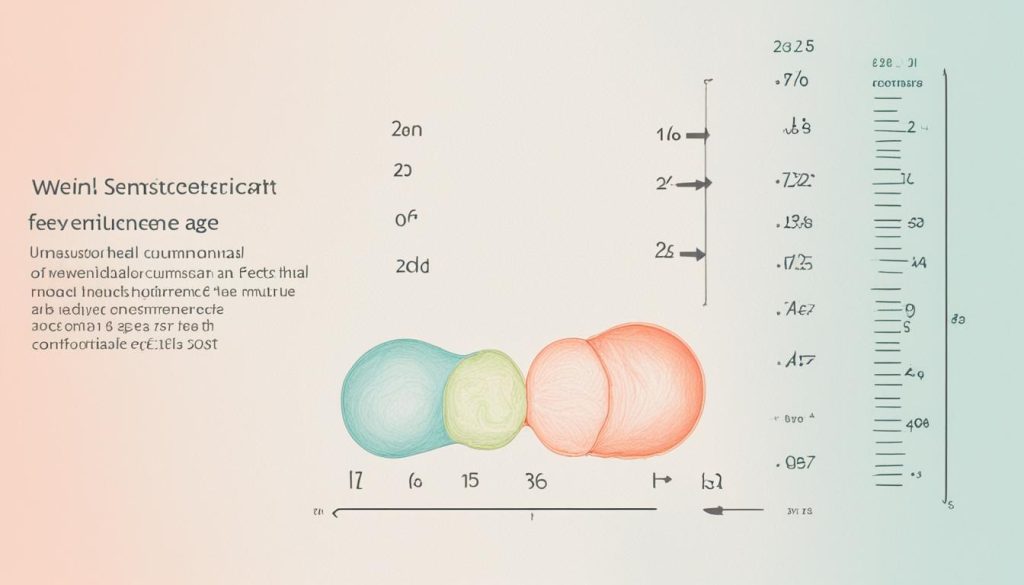When Did I Conceive and How Many Weeks Am I?
When trying to determine the date of conception and the number of weeks into your pregnancy, it can be challenging to pinpoint an exact day. The date of conception is typically estimated based on the first day of your last menstrual period, but this doesn’t necessarily align with when fertilization actually occurred. Factors such as irregular menstrual cycles and the timing of ovulation can further complicate the calculation.
However, there are methods and tools available, such as conception calculators and ultrasound scans, that can help provide an estimation of your conception date and how many weeks pregnant you are.
These resources take into account various factors to give you a better understanding of your conception date and the progress of your pregnancy. By utilizing these tools and consulting with your healthcare provider, you can gain valuable insights into your pregnancy journey.
Understanding Conception and Gestational Age
Conception is the remarkable moment when the sperm successfully fertilizes the egg, initiating the formation of a precious embryo. This pivotal event typically takes place between 11-21 days after the first day of your last menstrual period. However, accurately determining the exact date of conception can be challenging due to variations in menstrual cycles and the timing of ovulation.
Gestational age, on the other hand, is the measure used to track the progress of pregnancy. It is calculated from the first day of your last menstrual period and serves as a standard reference point. Estimating gestational age is crucial for monitoring fetal development and ensuring the overall well-being of both mother and baby.
To determine the fetal age more precisely, ultrasound scans can be utilized. These scans utilize sound waves to create detailed images of the fetus and can provide valuable insight into the developmental stage. By comparing the information from the last menstrual period and the ultrasound scan, healthcare professionals can estimate the conception date and accurately track the number of weeks into the pregnancy.
By understanding the conception process and the significance of gestational age, expectant parents can better comprehend the developmental milestones and progress of their pregnancy. The ability to estimate the conception date and determine fetal age not only fosters excitement and anticipation but also enables healthcare providers to provide appropriate prenatal care and support throughout the journey.
| Conception and Gestational Age | Key Points |
|---|---|
| Conception | The moment when the sperm fertilizes the egg, resulting in the formation of an embryo. |
| Gestational Age | Tracked from the first day of the last menstrual period, it serves as a standard reference point for monitoring pregnancy progress. |
| Ultrasound Scans | These scans use sound waves to create images of the fetus, allowing for a more accurate estimation of gestational age and fetal development. |
Using Conception Calculators and Due Date Calculators
When it comes to calculating your conception date and finding out your baby’s due date, online tools can be incredibly helpful. Conception calculators and due date calculators take into account various factors to provide an estimation of these important milestones. By inputting details such as the first day of your last period, the average length of your menstrual cycles, and ultrasound dates, you can gain a better understanding of when you might have conceived and when your baby is expected to arrive.
Conception calculators consider the length of your menstrual cycles and the timing of ovulation to estimate when fertilization may have occurred. They take these factors into account and provide you with a range of possible conception dates. This can be particularly useful if your cycle is irregular or if you are unsure about the exact date of conception.
Due date calculators, on the other hand, work by taking your conception date and adding the average length of a full-term pregnancy, which is approximately 40 weeks or 280 days. By calculating from the conception date rather than the first day of your last period, due date calculators provide a more accurate estimation of when your baby is likely to be due.
It’s important to note that these calculators provide estimations and are not definitive. The actual conception date and due date can vary based on individual circumstances and other factors. However, they can give you a starting point and a rough timeframe to anticipate your baby’s arrival.
Let’s take a look at an example of how a conception calculator might work:
| First day of last period | Average length of menstrual cycles | Estimated conception date |
|---|---|---|
| October 15, 2021 | 28 days |
In this example, if the first day of your last period was on October 15, 2021, and you have an average menstrual cycle length of 28 days, the conception calculator will estimate your conception date. Keep in mind that the calculator will consider the range of possible dates based on the information provided.
While conception calculators and due date calculators can be helpful tools, it’s always advisable to consult with your healthcare provider to confirm and track your pregnancy milestones accurately. They can perform ultrasound scans and other tests to provide more precise information about your conception date and due date.

Ultrasounds and Estimating Gestational Age
During pregnancy, ultrasounds play a crucial role in monitoring the progress and development of the fetus. They provide valuable insights into gestational age and can help healthcare providers estimate the conception date and track the number of weeks into the pregnancy.
Ultrasounds use high-frequency sound waves to create detailed images of the fetus, allowing healthcare professionals to assess its growth and development. These scans can typically be performed as early as five to six weeks after the last menstrual period. By analyzing the size and milestones reached by the fetus, healthcare providers can estimate the gestational age and determine the approximate conception date.
When used in conjunction with information from the last menstrual period, ultrasounds help establish a more accurate timeline of the pregnancy. This is especially important in cases where the timing of conception may be uncertain due to irregular menstrual cycles or fertility treatments.
To estimate gestational age and track pregnancy weeks, healthcare providers consider various factors observed during ultrasounds, such as the size of the fetus, the presence of limbs and organs, and the heartbeat. These indicators help determine the stage of development and provide insights into the pregnancy’s progress.

Benefits of Ultrasounds for Estimating Gestational Age
- Accurate assessment of fetal development
- Estimation of conception date
- Precise tracking of pregnancy weeks
- Detection of any potential abnormalities or complications
Ultrasounds offer a safe and non-invasive method to gather essential information about the progress of your pregnancy. By working closely with your healthcare provider and scheduling regular ultrasounds, you can ensure a healthy and well-monitored pregnancy journey.
Factors Affecting Due Date Calculation
When it comes to calculating your due date, several factors can come into play, making it a little challenging to pinpoint the exact date of conception and determine the number of weeks you’ve been pregnant. The length of your menstrual cycles and the timing of ovulation can vary, further complicating the calculation. Additionally, irregular periods and a lack of knowledge about the first day of your last menstrual period can add to the complexity.
It’s important to take these factors into account when using various methods to estimate your gestational age and determine how many weeks pregnant you are. By considering these variables, you can get a more accurate understanding of your due date and track the progression of your pregnancy.
Other Methods for Calculating Due Date
In addition to the traditional methods based on the first day of the last menstrual period, there are other ways to calculate the due date.
If you underwent in vitro fertilization (IVF), the transfer date of the embryo can be used to estimate the due date.
Pregnancy week calculators are also available online, where you input the first day of your last period or the exact day of conception to find out how far along you are in your pregnancy.
These alternative methods can provide additional insights into your due date.

Adjustments and Changes in Due Date
Your healthcare provider may adjust your due date if the measurements from an ultrasound scan differ significantly from the estimated gestational age based on the last menstrual period. This adjustment is more common for individuals with irregular menstrual cycles, as it can be challenging to determine the exact date of conception. The results of an ultrasound scan can provide more accurate information about the size and development of the fetus, which may lead to a revised due date.

Ultrasound scans are a vital tool for tracking the progress of your pregnancy and assessing the growth of your baby. By using high-frequency sound waves, these scans create detailed images of the fetus, allowing healthcare providers to gather valuable information about its development. As the fetus grows, its size and features become more distinct, which enables accurate estimation and adjustments to the due date if necessary. Ultrasound scans provide a visual representation of the baby’s development, offering valuable insights into gestational age and the need for any adjustments.
Conclusion
Determining the exact date of conception and the number of weeks pregnant can be complex due to various factors such as irregular menstrual cycles and the timing of ovulation. However, there are tools available to help estimate the conception date and track gestational age.
Conception calculators and due date calculators can provide an estimation based on the first day of your last period, average cycle length, and ultrasound dates. These tools can be useful in getting a general idea of when you might have conceived and when your baby is likely to be due.
It’s important to note that these estimations may not be exact, and adjustments to the due date can be made based on ultrasound measurements. Your healthcare provider can provide you with the most accurate information regarding your conception date and weeks of pregnancy. Consult with them to ensure you have the most reliable and up-to-date information.
In conclusion, while determining the exact date of conception and tracking the number of weeks pregnant can be challenging, utilizing tools like conception calculators and ultrasound scans can provide valuable estimates. Remember to consult with your healthcare provider for personalized and accurate information about your pregnancy journey.
FAQ
1. When can I determine the date of conception and how many weeks pregnant am I?
Determining the exact date of conception and the number of weeks pregnant can be challenging. The date of conception is typically estimated based on the first day of your last menstrual period. However, factors like irregular menstrual cycles and the timing of ovulation can complicate the calculation. Ultrasounds can provide a more accurate estimation of gestational age and fetal age.
2. How can I calculate my conception date and determine the gestational age?
You can use conception calculators and due date calculators available online. These tools consider factors like the first day of your last period and ultrasound dates to estimate your conception date and due date. Ultrasound scans can also help healthcare providers calculate gestational age more accurately.
3. How do ultrasounds help estimate gestational age and determine the fetal age?
Ultrasounds use sound waves to create images of the fetus. They can be performed as early as five or six weeks after the last menstrual period. By tracking the size and development of the fetus, ultrasound scans help healthcare providers estimate the conception date and track the number of weeks into the pregnancy.
4. What factors affect the calculation of the due date?
The length of menstrual cycles, timing of ovulation, and irregular periods can impact due date calculation. These factors can make it challenging to determine the exact conception date. Consulting with a healthcare provider and considering ultrasound measurements can help provide a more accurate estimation.
5. Are there other methods to calculate the due date?
Yes, if you underwent in vitro fertilization (IVF), the transfer date of the embryo can be used to estimate the due date. Pregnancy week calculators available online can also help you determine how far along you are in your pregnancy by inputting the first day of your last period or the exact day of conception.




